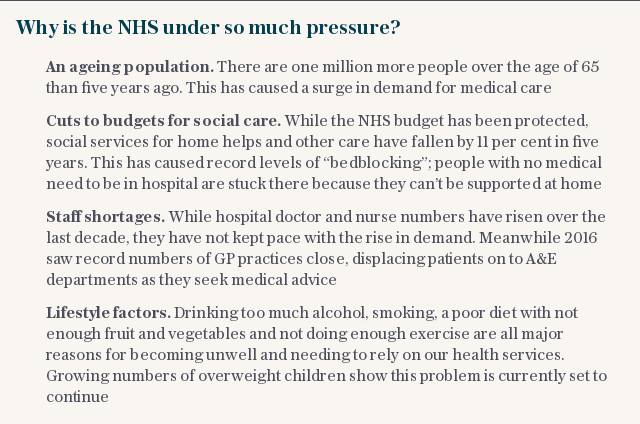NHS targets 'have had their day' says health service chief as he claims they encourage 'gaming'

NHS targets “have had their day” the head of the health service has said - on the day Accident & Emergency performance slumped to the worst level on record.
Lord Prior, chairman of NHS England, signalled plans to abolish the key measure, as records showed just 84.4 per cent of patients treated or admitted in four hours, against a 95 per cent target.
The performance for January is the worst since the target was introduced in 2004.
Lord Prior - a former health minister - yesterday suggested central ditkats had damaged patient care, encouraging “gaming” so that NHS trusts could appear to perform well, instead of prioritising patients for clinical reasons.
“We have had 15 years of this top-down target-driven culture that has driven the NHS. The degree of pressure to hit targets is something I have never encountered in the private sector, the unnuanced level of these targets.
“Of course the gaming that has developed around these targets and the bad behaviour…go to any A&E department and everyone measures the time…you get to 3 hours 55 minutes and all hell hits. Everyone runs around like headless chickens to get them out or get them through or discharge them before the four hours,” he told an event by think tank Reform.
“Targets have had their day I think,” he said. “They have encouraged this top-down, hierarchical control in the NHS which has been very damaging for the culture, and very bad for getting clinicians involved and engaged.”
The Tory peer also said that attempts to encourage competition within the NHS had been “deeply damaging” and had “failed almost totally”.
Lord Prior said many had feared that reforms by then health secretary Andrew Lansley would lead to privatisation.
In fact, he said there has been little change in NHS use of the private sector, but he said the structures introduced as a result of the changes had created a “dysfunctional” and “deliberately fragmented” system.
“I see the NHS long-term plan as putting it back together again. Where people work together not against each other,” said Lord Prior, who said that the NHS would “go bust in 10 years” if it did not invest in efforts to look after people outside hospital.
He made the comments as official data for January showed the worst NHS A&E performance on recor, wiht almost 84,000 patients waiting at least four hours.
NHS England is currently reviewing its clinical targets including the requirement that 95 per cent of all patients attending A&E are treated, admitted or discharged within four hours.
Its chief executive Simon Stevens has said changes are likely to mean a shorter waiting time target for treating conditions such as stroke, heart attack and sepsis, meaning those with less critical needs will need to wait longer.
The Royal College of Emergency Medicine (RCEM), which represents 8,000 emergency medicine clinicians, has said that abolishing the four-hour target would have a “near-catastrophic impact on patient safety".
Nuffield Trust chief economist Professor John Appleby said the NHS was “fighting a losing battle” in its efforts to provide timely healthcare.
"The proportion of patients spending more than four hours in A&E has risen to 15.6 per cent in January - the highest ever in this set of data.
"Only two major emergency departments in England met the four-hour target and attendances have risen by an astonishing 85,000 compared with January last year, increasing through the winter when they would usually fall,” he said.
"Last year, there was widespread concern as we saw trolley waits balloon, yet today's figures show an even higher level,” he said.
An NHS spokesman said thousands more people had been successfully treated in A&E within four hours, amid a 3.85 per cent rise in attendances this December and January, compared with last winter.


 Yahoo News
Yahoo News 
